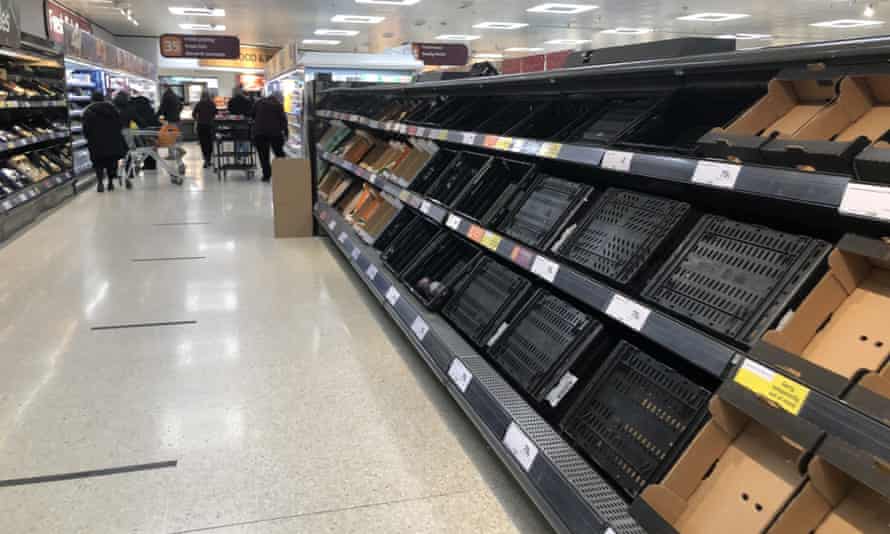Ministers are preparing to relax post-Brexit plans for border checks on food and other imports from the European Union because of fears that they will further damage trade and could lead to severe shortages in UK supermarkets.
The Observer has been told by multiple industry sources that Boris Johnson’s new Brexit minister, Lord Frost, is considering allowing “lighter touch” controls on imports from 1 April than are currently planned, and scaling back plans for full customs checks, including physical inspections, which are due to begin on 1 July.
One source said he had been told that Frost was preparing to put the plans, which could mean imports being allowed in even if clerical errors have been made by European companies, before fellow cabinet ministers this week, as evidence grows of how Brexit has hit trade with the EU.
A Downing Street source confirmed on Saturday night that Frost had already ordered “a review of the timetable to ensure that we are not imposing unnecessary burdens on business” but added that it was “early in the process and no decisions have been made”.
With UK exporters to the EU having been severely hit by new rules, regulations and costs of operating under the post-Brexit regime, business organisations and senior figures in Whitehall now fear that EU exporters to the UK – particularly those involved with food – could be even less prepared than their UK counterparts were at the start of this year.
A big worry is that delays resulting from checks could hit food supplies including the “just in time” delivery network.
One senior industry figure said: “The worry is that if we go ahead with more checks and move to checks on imports, then exporters will not be prepared and on this side we are not ready for that either. There is not the infrastructure in place yet or the number of customs officials necessary to carry all this out. We have already seen exports badly affected. The next nightmare could be imports.”
While the Cabinet Office, run by Michael Gove, has attempted to downplay the effects of Brexit on UK trade, a survey last week by the Food and Drink Federation of its members that send goods to the EU found a 45% drop in exports since 1 January.
Asked by the Observer on Friday if he was confident that plans for more checks on imports from the EU could go ahead from 1 April and 1 July, the chancellor, Rishi Sunak, said: “We are working through these things with the joint committee and I think we are looking at everything. If there are problems we are trying to address them. The systems and IT are all on track but we are keeping everything under review to make sure it is all as smooth as possible.”

While a key claim of Brexiters was always that Brexit would mean “regaining control of our borders”, doing so has proved hugely problematic since the UK left the single market and customs union on 1 January.
In order to give businesses time to adapt the government decided that imports into the UK from the EU could operate as normal until 1 April. From that date, under current plans, all items of animal origin such as meat, honey, milk or egg products, as well as regulated plants and plant products, will require full documentation and, where necessary, veterinary certificates to be sold in the UK. From 1 July, all companies exporting to the UK will be required to fill out full customs declarations and goods could be subjected to physical checks at new UK customs centres.
Richard Burnett, the chief executive of the Road Haulage Association, said: “We are hearing from government that they are going to take a ‘light touch’ approach to the next phase, or perhaps even an extension of the grace period. Although this is sensible to continue the uninterrupted flow of food products from the EU into Great Britain, I am concerned that it weakens the government’s negotiating leverage when asking for similar easements from the EU for UK businesses attempting to trade with them.”
In a further sign of post-Brexit problems, Gove last week announced that grace periods to allow lighter enforcement on EU rules over supermarket goods, pharmaceuticals, chilled meats and parcels from Great Britain into Northern Ireland should be extended to January 2023.
Some of the current waivers are due to cease at the end of March, raising fears about further border disruption. The issue of the new border in the Irish Sea has caused renewed tensions in Northern Ireland, while also worsening already poor relations with Brussels, which is considering legal action against the UK for breaking Brexit agreements.
Frost, writing in the Sunday Telegraph, has called on Brussels to “shake off any remaining ill will” towards the UK for leaving and argued the government is acting legally to protect the everyday lives of people in Northern Ireland. “I hope they will shake off any remaining ill will towards us for leaving, and instead build a friendly relationship, between sovereign equals.”
In its report accompanying last week’s budget, the Office for Budget Responsibility repeated its view that the additional trade barriers caused by Brexit would reduce UK productivity in the long run by about 4%.
On Saturday night the shadow Cabinet Office minister, Rachel Reeves, wrote to the OBR’s chair, Richard Hughes, asking him to publish details of its assessment of the economic effects of the trade deal with the EU, including its effect on exports and different regions of the UK.
Referring to the OBR’s estimate of a 4% fall in productivity, Reeves told Hughes: “This is extremely concerning and that concern is compounded by the government’s lack of response in addressing or even acknowledging this gap.”





